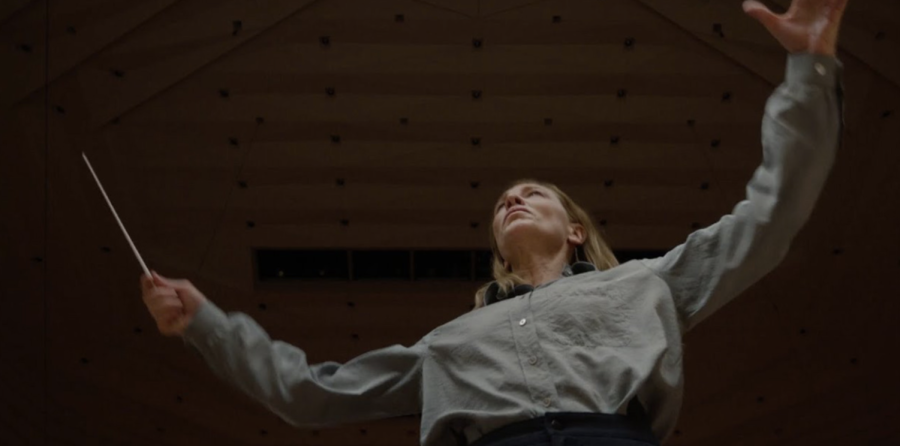‘TÁR’ is virtuosic
Staff writer James Watson gives the film a “TÁR”-iffic review
In “TÁR,” Lydia Tár conducts a damning portrait of abuse and power.
November 11, 2022
Let’s get this out of the way — Lydia Tár is not a real person. But the aptly titled new drama, “TÁR” from director Todd Field has managed to convince many that Cate Blanchett’s domineering maestro is a real presence in the Berliner composer world. Over the last few weeks, this has become somewhat of a running joke on the internet, with Vulture even going so far as to publish a satirical biography of Lydia Tár, further adding to the illusion. Biographical entries included “Tár donated to Michael Bloomberg’s presidential campaign” and “Tár already pays $8 a month for a blue check, for unknown reasons.” The notion that this singular character has inspired such confusion and amusing discourse speaks to the breathtaking power and confidence of this accomplishment of film. Field and Blanchett have created a document of staggering intrigue and intensity in “TÁR”.
The film’s subject, the titular Lydia Tár, is a master composer whose resume knows almost no limits. From producing music with south Asian indigenous tribes to serving as a direct pupil of Leonard Bernstein, the magnitude of her accomplishments creates an inescapable aura of myth. Tár herself seems to recognize this aggrandized image; styling herself in a masculine, conservative manner to maintain a kind of iconography. The film first finds her preparing a production of Gustav Mahler’s “Symphony No. 5” — Tár’s Moby Dick. This is a piece of enormous importance for her, which immediately creates a sense of urgency and pressure that consumes the film. While TÁR is not explicitly a thriller, the tension drives the plot even when it takes a prodding, methodical pace — something I quite enjoyed.
“TÁR” is so dense with thematic potential that it’s a little overwhelming to dissect, but, fundamentally, it’s a treatise on power. Tár is obsessed with power — maybe understandably so, due to the sheer amount she’s cultivated despite treacherous occupational politics. The way she dresses, the way she speaks and the way she carries herself communicates that you should respect her — and perhaps fear her. In a few early instructive scenes, we see Tár speak largely in pseudo-academic nonsense: “You must in fact stand before the audience and God and obliterate yourself” — What does this even mean? Worse yet, this linguistic disarmament is used against a room full of Julliard undergrads. Immediately, Tár demands you honor her superiority. She is a God and you are a mortal. Don’t understand what she’s saying? That’s because you’re a nothing philistine. This dangerous master-and-commander dynamic is so key to her success, both as a person and as a maestro, that her character functions as an indictment of the toxic orthodoxy that consumes the academic music world. Additionally, she embodies a critique of how women like Tár adopt toxic masculinity to get what they want — even going so far as to groom and abuse other female students. The gender politics of “TÁR” are incredibly potent, but Field mercifully remains ambivalent on issues of cancel culture. Tár is rightly subject to the intense scrutiny of the public and the internet for her obvious abuses of power, but she is depicted more as a product of her own environment than a hapless victim. Tár is singularly a product of the power structures into which she has had to assimilate in order to attain the influence she has, which is by far the most damning revelation that the film offers.
Mistakenly, I expected the film would veer into obvious, explosive moments of tyranny as in works such as “There Will Be Blood” or “Whiplash”, but Field makes it clear he’s not interested in reactionary gestures. Subtlety is a weapon here (how refreshing). Make no mistake, Tár herself is an insidious force, but she’s incredibly nuanced, and the refusal to box her into any monolithic characterization is incredibly rewarding for the viewer. Stylistically, it conjures a Kubrickian formalism. While not flashy nor “aesthetic”, the visual style is practical and executed with steely professionalism. And though “TÁR” is a serious, often dangerous-feeling movie, humor is a crucial element. Field knows exactly when to use it and how to make Tár the butt of the joke. The ending is perhaps the funniest moment of 2022 cinema.
Finally, where would any of this be without Cate Blanchett? Her performance is frankly incomprehensible. Considering Blanchett’s career of outstanding performances, I am reluctant to call “TÁR” her greatest. But if this isn’t a career-defining performance, I’m not sure what is. She reads Field’s lines as if they were spoken by a real person. There is an extended interview sequence early on in the film featuring The New Yorker’s own Adam Gopnik in which the line between acting and reality is almost invisible. Blanchett dances through the scene in what appears to be a seamless one-take. This scene, consisting exclusively of dialogue, mesmerized me more than any film I have seen this year — and I say that having loved Jordan Peele’s “Nope”.
“TÁR” is a revelation, a tour-de-force of film craft and a ferocious statement on gender politics, power and the insidious ambition required to accrue it. Run, don’t walk to see it — preferably in allegro time.















